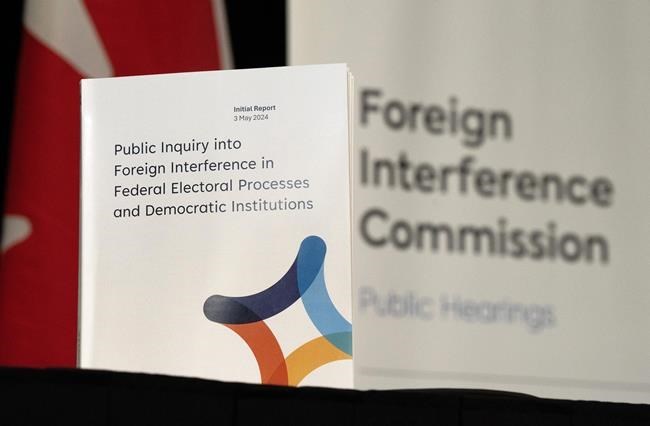OTTAWA — Newly tabled legislation to fight interference from abroad would bolster criminal provisions, open the door to broader sharing of sensitive information and establish a foreign influence transparency registry.
The Liberal government introduced the bill Monday in the House of Commons, saying it would better equip authorities to detect, disrupt and protect against foreign meddling.
"Canada is a strong, open and free democracy," Public Safety Minister Dominic LeBlanc told reporters. "These strengths, however, can make Canada a target for those who wish to advance their interests, to the detriment of our own."
The legislation would create targeted foreign interference offences aimed at deceptive or surreptitious acts that undermine democratic processes. An example would be covertly influencing the outcome of a political process such as the nomination of a candidate, the government says.
Another new offence would outlaw deceptive or clandestine acts that harm Canadian interests — for instance, helping foreign agents posing as tourists to enter Canada.
In addition, the bill would amend the law to better address foreign intimidation of members of diaspora communities in Canada.
A new sabotage offence would focus on conduct directed at essential infrastructure such as systems that enable transportation or communications, or support delivery of health and food services.
The bill would also allow the Canadian Security Intelligence Service to disclose sensitive information beyond the halls of government to build resiliency against foreign meddling.
States might engage in interference to advance foreign political goals, and can employ people to act on their behalf without disclosing ties to the foreign state.
The new foreign influence transparency registry would require certain individuals to register with the federal government to help guard against such activity.
An independent commissioner would administer the registration scheme, to be enforced through notices, monetary fines and, in the most serious cases, criminal penalties.
The bill would also:
— introduce new CSIS warrants for specific investigative techniques;
— enhance CSIS's capacity to use datasets of information;
— help CSIS collect, from within Canada, foreign intelligence about the intentions and capabilities of foreign states and individuals;
— and create a streamlined process under the Canada Evidence Act relating to the protection and use of sensitive information in proceedings such as judicial reviews and statutory appeals in Federal Court.
The bill comes just days after a federal commission of inquiry found foreign interference from China, India, Russia or others did not affect the overall results of the 2019 and 2021 general elections.
In an interim report Friday, commissioner Marie-Josée Hogue said it was possible — but not certain — that outcomes in a small number of ridings were affected by meddling.
Hogue generally concluded that foreign interference had undermined public confidence in Canadian democracy, saying it was perhaps the greatest harm Canada had experienced.
The Business Council of Canada applauded the new bill, saying CSIS would be able to communicate more specific and tangible information with Canadian companies.
"This would give business leaders a clearer understanding of the growing threat, as well as the protective measures that could be taken to better safeguard their employees, customers and the communities in which they operate," said council president Goldy Hyder.
More needs to be done to address foreign interference, especially actions that involve threats or lead to actual harm, said the Ottawa-based International Civil Liberties Monitoring Group, a coalition of 45 organizations including Amnesty International, the Council of Canadians and the Canadian Muslim Forum.
However, many of the proposals in the bill go far beyond addressing foreign interference and will have wide-ranging impacts on the rights and liberties of people in Canada, the monitoring group said.
This includes significant changes to CSIS's powers to secretly collect and analyze troves of information about Canadians, what information CSIS can disclose and to whom, and new rules around what evidence can be disclosed in open court, the group said.
"These and other changes deserve their own specific scrutiny but instead are being lumped in with another omnibus bill."
This report by The Canadian Press was first published May 6, 2024.
Jim Bronskill, The Canadian Press




